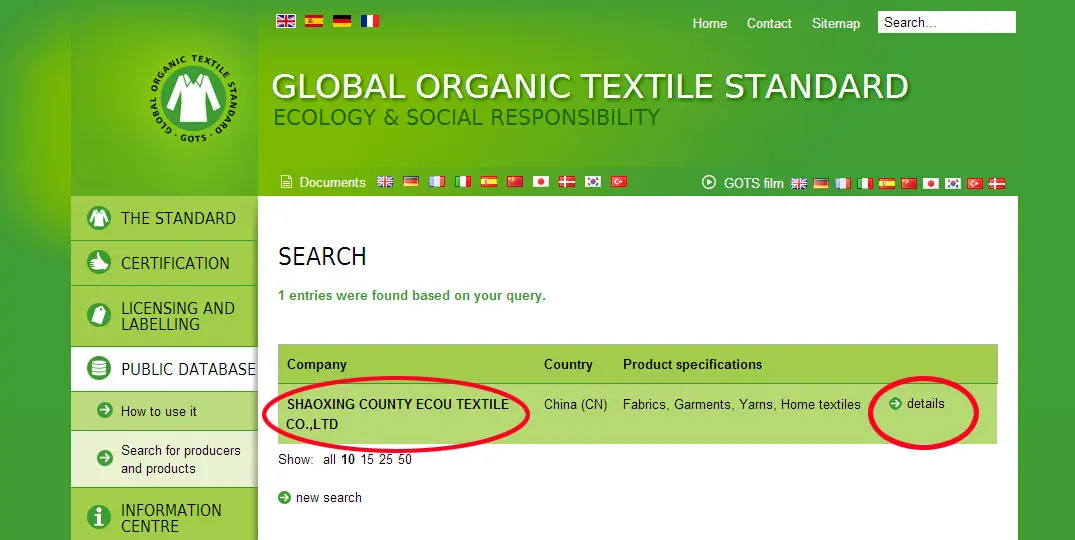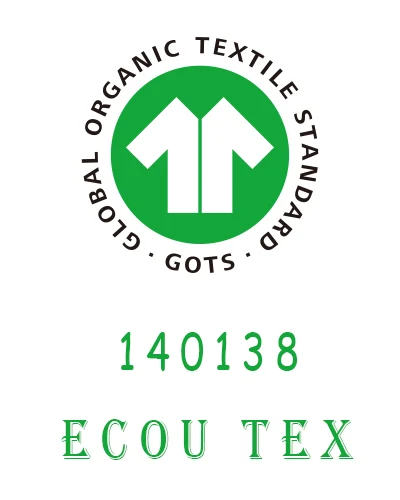* Organic cotton can be tested.
Transgenic (GMO) testing is the only method for testing the composition of organic cotton.

How to distinguish the real organic certified manufacturer ?
Step 1: Check the license number on certificate
Every GOTS certified manufacturer has a unique license number for their GOTS certificate.
Step 2: Open the GOTS link : www.global-standard.org
Type the certificate number and click Search button

Step 3: You can search the appropriate information of the supplier

Step 4: Click ?details? button,It will show the detailed information about this supplier

If it can be found, it means this is a certified manufacturer,
If not, just forgot it.
For more tips, welcome to contact our Ecou Team.
info(at)fabricfactory.cn
Why Organic  http://youtu.be/8ru6zXbRJhY
http://youtu.be/8ru6zXbRJhY  http://youtube.com/watch?v=POJP7_I7YbU
http://youtube.com/watch?v=POJP7_I7YbU
Cotton agriculture and textile production utilize large amounts of chemicals. Cotton is the main raw material in the clothing industry. Based on a report made for the World Wildlife Fund, less than 3% of the agricultural land is planted with cotton. However that 3% of land consumes 20% of all the pesticides and 22% of all insecticides used annually.
The same report states that 46 different chemicals are commonly used during the cotton-growing process and five of those chemicals are considered “extremely hazardous.” Often the drift from these chemicals being sprayed ends up contaminating nearby wetlands and soil.
There are many more chemicals involved in processing cotton. There are more than 8000 different chemicals that go into the making of a t-shirt. So many different chemicals are used to soften the fibers and strip them from their waxy texture.
Organic cotton grows in a chemical-free environment. As a result, it’s texture is slightly rougher and it is a natural off white color. Organic cotton is processed using very advanced methods that utilize natural enzymes. From a price point of view the initial costs of producing organic fabrics are more expensive, but the long term advantages are priceless.
Why should you use organic fabrics for your children?
The skin is the largest organ of the body. It allows many chemicals to pass into your child via absorption. A baby’s skin is especially sensitive since it is thinner and more permeable than adult skin. Children have a tendency to be more influenced by their environment relative to their body weight. The amount of contaminants that they receive will have a much greater impact on them in comparison to adults because children’s bodies are much smaller.
If you refer to many of the studies that are available to the public, you’ll read about how many of the chemicals used in the textile industry contribute to health problems like asthma, cancer, ADD, and more.
Our customers tell us that they choose organic fabrics for various reasons. Some seek to lower the environmental impact of the decisions that they make. Some of them want organic fabrics next to their children’s skin due to allergies. Some of them are concerned about the amount of chemicals being introduced to their child’s environment. A few mention that organic fabrics don’t smell the way conventional cotton, processed with chemicals, does. Others state that organic fabrics don’t hold stains like synthetics do.
It is our belief that the choices we make, from our diet to clothing, as well as our living and social environment, must help us to live our life to its full capacity, both mentally and physically. We believe that by making the right choices we can prevent some of the diseases that can ruin lives as well as stop the pollution that is ruining our beautiful planet.
Whatever reason we give for choosing organic fabrics, Funny Fabrics intends to provide the highest quality organic fabrics for all of our customers, from the home sewer to the business sewer.
GOTS Certification
The global organic textile standard (GOTS) is a globally accepted processing standard for the production of textiles made with organic fibers. Its ultimate purpose is to define requirements throughout every step of the fabric-making process in order to ensure the credibility of the organic status of the fabrics. From the cultivation of the fibers, through environmentally and socially sensible processing, through the labeling of the fabrics, the consumer is assured of the organic quality of the final product.
When fabric has a label that says “GOTS Certified Organic,” you are assured of the following:
- It contains a minimum 95% certified organic fibers that are farmed in compliance with GOTS.
- Every link of the chain of production, namely the farmers, weavers, spinners, dyers, and printers are GOTS certified. If even one link along that chain of productions is not GOTS certified, then the final product cannot be labeled as “GOTS certified organic” fabric.
- Only GOTS approved chemical inputs are used.
- It does not contain any material processed with GMO (Genetically modified organism) technology.
- Processing and production were done under circumstances which do not have a negative impact on the environment.
- GOTS certified organic fabrics are produced by workers whose employment is freely chosen, who work in safe and hygienic conditions, and whose rights of collective bargaining are respected. They receive living wages and no inhumane treatment is allowed. Child labor is strictly prohibited.


